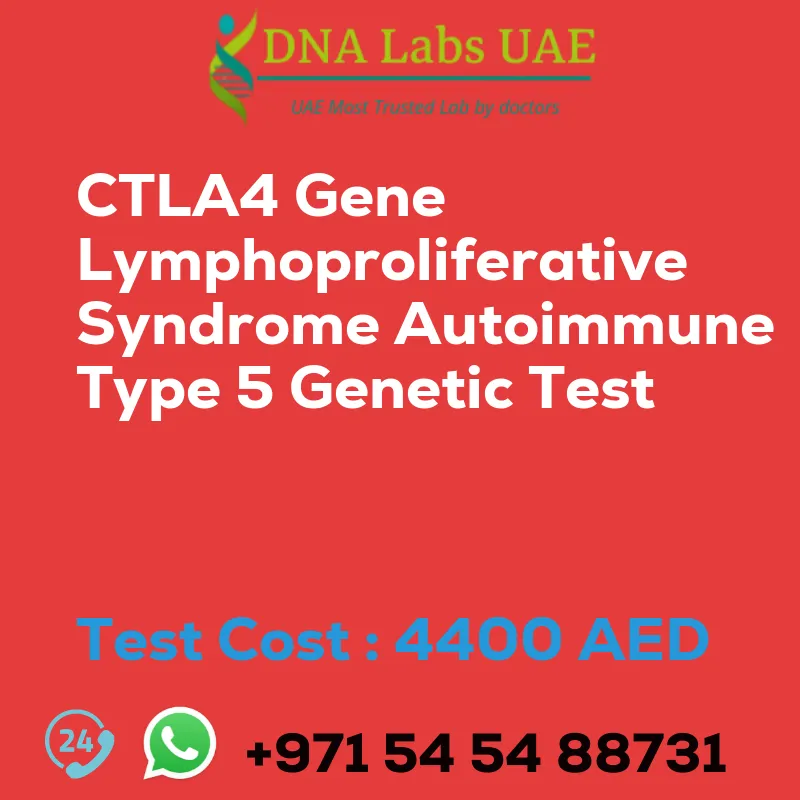CTLA4 Gene Lymphoproliferative Syndrome Autoimmune Type 5 Genetic Test
Welcome to DNA Labs UAE, where we offer the CTLA4 Gene Lymphoproliferative Syndrome Autoimmune Type 5 Genetic Test. This test is designed to analyze the CTLA4 gene and detect any mutations or variants that may be associated with lymphoproliferative syndrome and autoimmune diseases.
Test Components and Price
The CTLA4 Gene Lymphoproliferative Syndrome Autoimmune Type 5 Genetic Test is priced at 4400.0 AED. The test requires a blood sample, extracted DNA, or one drop of blood on an FTA card.
Report Delivery and Method
After the sample is collected, the report will be delivered within 3 to 4 weeks. The test utilizes NGS (Next-Generation Sequencing) technology, which allows for the analysis of multiple genes simultaneously.
Test Type and Doctor
The CTLA4 Gene Lymphoproliferative Syndrome Autoimmune Type 5 Genetic Test falls under the category of Hematology. It is recommended to consult with a Hematologist for this test.
Test Department and Pre-Test Information
The test is conducted in our Genetics department. Before undergoing the CTLA4 Gene Lymphoproliferative Syndrome Autoimmune Type 5 Genetic Test, it is important to provide the clinical history of the patient. Additionally, a Genetic Counselling session may be required to draw a pedigree chart of family members affected by the syndrome.
Understanding the CTLA4 Gene and Lymphoproliferative Syndrome
The CTLA4 gene encodes a protein called cytotoxic T-lymphocyte-associated protein 4 (CTLA-4). This protein is primarily found on the surface of T cells, which are a type of white blood cell involved in the immune response. Lymphoproliferative syndrome refers to a group of disorders characterized by abnormal proliferation of lymphocytes, a type of white blood cell.
Autoimmune Type 5 Lymphoproliferative Syndrome
In the case of CTLA4 gene lymphoproliferative syndrome, there is a mutation or dysfunction in the CTLA4 gene, leading to impaired regulation of the immune system. This dysfunction results in an overactive immune response, leading to the development of autoimmune diseases. Autoimmune diseases occur when the immune system mistakenly attacks and damages healthy tissues in the body. Type 5 autoimmune lymphoproliferative syndrome (ALPS) specifically refers to the dysfunction of the CTLA4 gene.
Importance of NGS Genetic Testing
NGS (Next-Generation Sequencing) genetic testing is a high-throughput method used to analyze multiple genes simultaneously. In the context of CTLA4 gene lymphoproliferative syndrome, autoimmune, type 5, NGS genetic testing can identify mutations or variants in the CTLA4 gene associated with the syndrome. This testing is crucial in diagnosing individuals with the condition and guiding appropriate management and treatment strategies.
| Test Name | CTLA4 Gene Lymphoproliferative syndrome autoimmune type 5 Genetic Test |
|---|---|
| Components | |
| Price | 4400.0 AED |
| Sample Condition | Blood or Extracted DNA or One drop Blood on FTA Card |
| Report Delivery | 3 to 4 Weeks |
| Method | NGS Technology |
| Test type | Hematology |
| Doctor | Hematologist |
| Test Department: | Genetics |
| Pre Test Information | Clinical History of Patient who is going for CTLA4 Gene Lymphoproliferative syndrome, autoimmune, type 5 NGS Genetic DNA Test. A Genetic Counselling session to draw a pedigree chart of family members affected with CTLA4 Gene Lymphoproliferative syndrome, autoimmune, type 5 NGS Genetic DNA Test gene CTLA4 |
| Test Details |
The CTLA4 gene is responsible for encoding a protein called cytotoxic T-lymphocyte-associated protein 4 (CTLA-4). This protein is primarily found on the surface of T cells, which are a type of white blood cell involved in the immune response. Lymphoproliferative syndrome refers to a group of disorders characterized by abnormal proliferation of lymphocytes (a type of white blood cell). In the case of CTLA4 gene lymphoproliferative syndrome, there is a mutation or dysfunction in the CTLA4 gene, leading to impaired regulation of the immune system. Autoimmune diseases occur when the immune system mistakenly attacks and damages healthy tissues in the body. In type 5 autoimmune lymphoproliferative syndrome (ALPS), the dysfunction of the CTLA4 gene leads to an overactive immune response, resulting in the development of autoimmune diseases. NGS (Next-Generation Sequencing) genetic testing is a high-throughput method used to analyze multiple genes simultaneously. In the context of CTLA4 gene lymphoproliferative syndrome, autoimmune, type 5, NGS genetic testing can be used to identify mutations or variants in the CTLA4 gene that may be associated with the syndrome. This can help in diagnosing individuals with the condition and guiding appropriate management and treatment strategies. |








